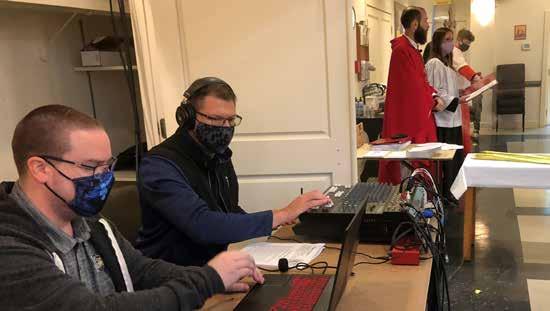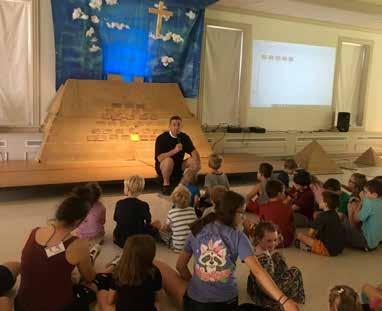
4 minute read
Strengths, Challenges, Hopes, and Dreams
Then you will know that I am the Lord, those who hope in me will not be disappointed. ISAIAH 49:23B
The conversations in our listening sessions provided thoughts on our strengths, challenges, hopes, and dreams for the Diocese of Maryland. As a leader of the episcopate, the bishop is the face of the Church. Your voice has weight and expressing it on the causes you support is important and necessary. Taking care of the inner workings of the Diocese is part of the job, as is being aware of the outreach aspect of the position. The Diocese of Maryland has taken the lead on consequential issues. This provides an opportunity for the bishop to step up and embrace new or existing ministries or causes that can change lives. The destination of the Diocese of Maryland is “to be a community of love,” and the bishop has the potential to move the needle on social problems, set the bar high, and challenge the flock to engage as well. As we move towards ending the restrictions of a pandemic, we believe that growing the Diocese, while considering today’s demographics, is a priority for our next bishop. Reversing declining membership and growing our membership will require the development of creative and innovative ways to help existing congregations stay in business. Some suggested closing or merging parishes, while others believe we are ripe for church plantings. The new bishop will have to take the time to evaluate the reality of both these options and the impact it would have on specific regions and congregants in the diocese. The pandemic forced us to adapt how we “do church,” and in some instances technology helped us reach more people than before. Smaller city and rural parishes were challenged with fewer people and limited financial resources. Some larger churches maintained the status quo, but still feel the need to reach more people. We see attracting and retaining young parishioners and young families as a major opportunity for our next bishop. Congregations will be looking for leadership as shrinking membership, age demographics, and the critical need to recapture lost vitality are a cause for concern.
Advertisement
Our mission to be seen as welcoming to all people in our diverse communities, whether characterized by ethnicity, race, sexual and gender orientation, language differences, age, or economic circumstances has not wavered. The people of our diocese state the importance of being more inclusive and open to minorities, both clergy and lay. Many of our congregations welcome and embrace a relationship with LGBTQ+ people. We see our diversity as a gift, and we work faithfully and intentionally to hold the many differing perspectives of our church family in a creative tension and dialogue that enriches us all. The next bishop should be open to engaging conversations about racial reconciliation, have an active role in the reparations programs of the Diocese, and be aware of individual parishes’ initiatives. At the 236th Diocesan Convention, Resolution 2020-06 passed, allocating a $1,000,000 seed fund to support the work of reconciliation and racial restitution throughout the Diocese.
The Diocese of Maryland has been exploring the legacy of slavery and its impact on congregations and communities throughout the diocese for many years. The Trail of Souls, several General Convention resolutions, and the establishment of the Truth and Reconciliation Commission are just a few of the measures the diocese and individual congregations have utilized to keep conversations about racial and social injustice at the forefront of diocesan ministries. The evidence of systemic racism, though denied by some, has remained a fallout of our past and should be an issue the new bishop can address. How we approach these issues and others like it, can lead to some disagreement and contentiousness. The next bishop should be a reconciling person who will listen to all sides of an issue, understanding that there are vastly different experiences and perspectives among our congregants. Sometimes polar opposite positions, perspectives, opinions, views, and stances are vocalized. We are seeking someone who can navigate and occupy spaces of tension and conflict and be a source of resolution and healing. There is a strong desire for involved leadership in expanding fellowship between parishes and for collaboration in programming and common resources. Increasing communication at all levels is necessary to achieve and maintain a connection with the Diocese. Our next bishop has a great opportunity to increase the quality and frequency of communications from the diocese. It was suggested that there be more fellowship opportunities for clergy and workshops for sharing ideas and activities at both the diocesan and parish levels. Clergy and congregations want more communication about what our diocese does, how it supports our parishes, and about our relationship with The Episcopal Church and the worldwide Anglican Communion. The work of a bishop is rewarding, but it is also demanding and challenging and requires a lot of energy. Paying attention to spiritual, physical, and emotional self-care and well-being is important. Don’t let the job wear you down. Embracing the Fruits of the Spirit (Galatians 5), having a recognizable connection with God in both a prayer life and service life is a good place to start. A diocese and its congregations are never healthier than their leader. Taking care of oneself in all ways is important in order to lead, and do so by example. It is important to carry the position humbly, lead with collegiality, be able to take criticism, and admit when they are wrong. Take advice in the spirit that it is given. Also, being able to laugh with others and even at yourself is a gift. We are humbled by this opportunity to seek a new bishop for the Diocese of Maryland. We are eager to share our future together.







